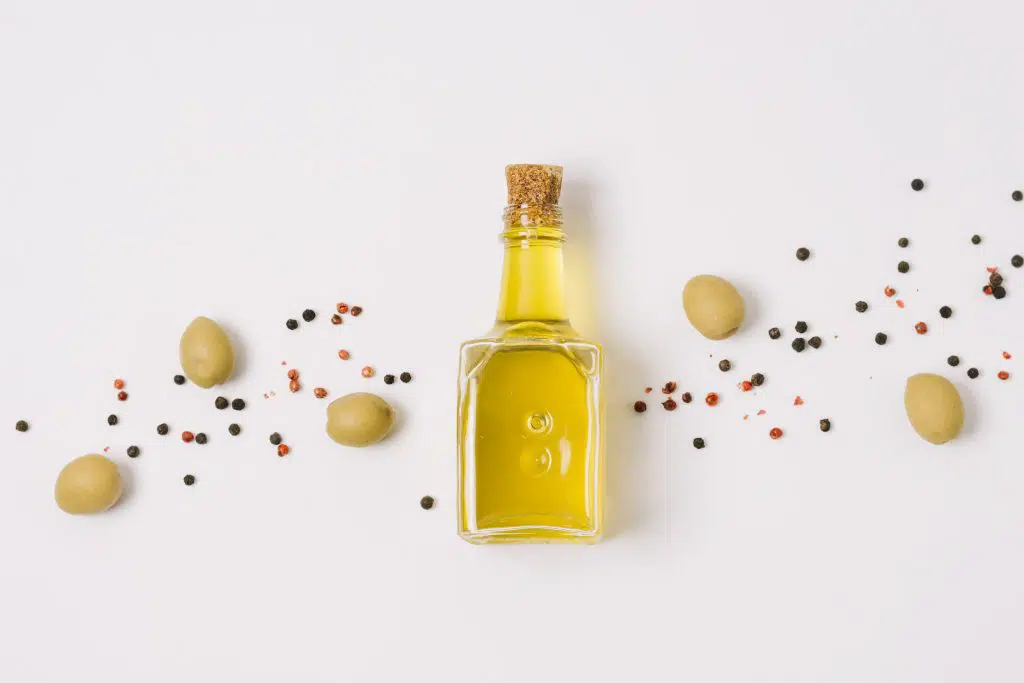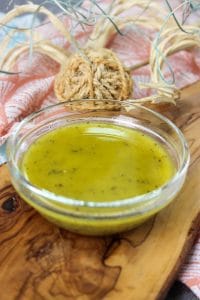Best Low FODMAP Oils
Important Note: When you buy through our links, we may earn a commission. As an Amazon Associate we earn from qualifying purchases. Content, pricing, offers and availability are subject to change at any time - more info.
Fortunately, you don’t need to think twice about using oil on a low FODMAP diet. All you need to figure out is the amount of oil that is appropriate and how to get the maximum benefits and flavor from every option.
In general, oil is 100% fat and does not contain FODMAPs. Since oil does not contain carbohydrates, it is free from the sugar molecules found in high FODMAP food. Fat should be consumed in moderation: Monash University recommends one tablespoon per serving.
How does oil fit into a low FODMAP diet? Is there a limit on the amount that can be consumed? What are the best low FODMAP oils to use? Discover which oils are best for you and how to incorporate them into a healthy and balanced low FODMAP diet.
- Is Oil Allowed On A Low FODMAP Diet?
- How Much Oil Can I Consume On A Low FODMAP Diet?
- The Best Low FODMAP Oils
- Which Oils Should I Avoid On A Low FODMAP Diet?
- How To Shop For A Good Low FODMAP Oil
- What Are The Best Low FODMAP Oils?
Is Oil Allowed On A Low FODMAP Diet?

Oil is allowed on a low FODMAP diet — in moderate amounts. In general, 1 Tbsp oil contains about 120 calories, and all the calories come from fat. Since oil is purely fat, it is free from the FODMAP carbohydrates, a group of sugar molecules that some people battle to absorb and digest.
Even though oils are predominantly FODMAP-free, they still need to be consumed in moderation, as excess amounts affect gut function and may trigger unpleasant digestive symptoms, particularly in people who have irritable bowel syndrome (IBS) or other digestive conditions.
It is essential always to read the label before you purchase or consume oil-based sauces, dressings, and condiments as they may contain high FODMAP ingredients such as wheat flour or garlic.
How Much Oil Can I Consume On A Low FODMAP Diet?

According to Monash University, a limit of 1 Tbsp oil per serving is acceptable on a low FODMAP diet.
Make sure you limit your oil intake, as high amounts of fat stimulate contractions in the digestive tract, which can either slow down stomach emptying and cause constipation- or speed up movement, leading to diarrhea.
People with IBS and digestive conditions are usually highly sensitive to fats and oils, and excessive amounts can exacerbate their symptoms. Test your tolerance levels for the various oils and make adjustments as needed.
Keep in mind that the oil used to prepare your meal (frying oil/marinade), along with oil added at the end (salad dressing/sauces) need to be accounted for in each serving. Remember that nuts, seeds, olives, dairy, and meat will also contribute to your daily fat intake.
Oil can be extremely useful and versatile when cooking and preparing meals on a low FODMAP diet, and, thankfully, a little goes a long way!
The Best Low FODMAP Oils

A-Z of the best low FODMAP oils is listed below, which includes their health benefits and the best way to use them:
Avocado Oil
It may come as a pleasant surprise to see avocado oil listed as FODMAP-friendly, especially since avocados are a notorious high FODMAP food and a severe offender for people with IBS. The extraction process leaves behind a pure oil free from the FODMAPs found in the fruit’s flesh.
Avocado oil is rich and buttery, and it won’t overpower the other ingredients — just like the actual avocado! Like extra virgin olive oil, it is unrefined, and better yet, avocado oil has a higher smoking point, which means it can be used for cooking at high temperatures.
Avocado oil is particularly high in oleic acid (a heart-healthy fat), antioxidants, and Vitamin E, which are known to support good eyesight, skin, and heart health.
Fresh avocado oil can be used to add a buttery finish to smoothies, salads, and dips. As a cooking oil, it can also be used for baking, grilling, and frying. The only drawback is that it tends to be more expensive than other oils.
Coconut Oil
Both unrefined and refined coconut oils are low FODMAP. Even though coconut oil is high in saturated fats, this tropical oil exploded onto the health scene to prove that, when consumed in moderation, it can be enjoyed as a healthy and versatile oil.
The MCTs (medium-chain triglycerides) and lauric acid in coconut oil have been linked to potential health benefits such as an enhanced immune system and improved hair, skin, and oral health. Coconut oil can help restore a healthy balance to intestinal bacteria in the gut.
Monash University recommends that you limit your consumption of coconut oil to 1 Tbsp per serving. Bear in mind that this oil will contribute to your saturated fat intake, which should be consumed in minimal amounts. Extra virgin coconut oil offers maximum quality and benefits.
Coconut oil can be used for medium-heat cooking at temperatures up to 350°F (175°C). It is an excellent choice for when you need to sauté, stir-fry, bake, or make stovetop popcorn!
Flaxseed Oil
Flaxseed oil (also known as linseed oil or flax oil) gets the green light as a low FODMAP oil. A serving size of 1 Tbsp is recommended.
This nutritious oil is made from ground and pressed flaxseeds, and it is loaded with omega-3 fatty acids, which are linked to reduced inflammation, longevity and aids in the health of your heart, brain, skin, and gut. It is one of the best plant sources of omega-3 oils.
Flaxseed oil is sensitive to heat, light, and oxygen. To preserve its benefits, it needs to be stored in a dark glass bottle and should not be used for cooking, as harmful compounds are released when exposed to heat. This oil has a mild taste and works well as a healthy base for dips, salad dressings, smoothies, and sauces for creaminess and a boost of nutrition.
Hemp Seed Oil
Yes, hemp seed oil is low FODMAP, and no, it won’t make you high! 1 Tbsp hemp oil per serving is recommended on the low FODMAP diet.
The countless health benefits of hemp seed oil come from its polyunsaturated and omega-3 fat content. Studies show that hemp oil may help to:
- Strengthen the skin.
- Promote heart health.
- Reduce inflammation.
- Alleviate symptoms of menopause and PMS.
- Support a healthy pregnancy.
Hemp seed oil is sensitive to heat, so instead, enjoy it fresh for maximum flavor and benefits. Give your smoothie, salad, avocado toast, and sauces some creamy goodness with a drizzle of this valuable oil.
Olive Oil — Pure, Virgin And Extra Virgin
Standard, extra virgin and virgin olive oils are low FODMAP. Known for its incredible anti-aging properties, olive oil forms the basis of the well-known Mediterranean diet. 1 Tbsp olive oil per serving is the recommendation of Monash University.
Olive oil is rich in monounsaturated fats, especially oleic acid, which has been shown to combat inflammation. Olive oil is loaded with antioxidants and anti-inflammatory properties that may protect against Alzheimer’s, osteoporosis, cancer, and skin aging.
Olive oil also contains a powerful antioxidant called Oleocanthal, which has similar anti-inflammatory properties to Ibuprofen. Recent studies show that olive oil has positive effects on intestinal health and increases good gut bacteria.
High-quality, cold-pressed extra virgin olive oil will gift you with the most health benefits and incredible flavor. It is also the most stable olive oil to cook with. It can be heated up to 400°F (204°C).
Extra virgin olive oil is best consumed fresh for maximum flavor and nutrition, such as a salad dressing or drizzled over veggies, pasta, and avocado toast.
Peanut Oil
Peanut oil — which can be seen floating in a brand-new jar of 100% natural peanut butter — is nutritious and low in FODMAPs! The recommended low FODMAP serving size of peanut oil is 1 Tbsp.
Although peanut oil has a slightly nutty taste, it is generally a good, neutral option for most recipes. With a high smoke point of 450°F (232°C), it can withstand high temperatures without burning. This oil can create a crisp texture for French fries, tempura, and other fried foods.
As it is rich in Vitamin E and monounsaturated and polyunsaturated fatty acids (the “good type of fats”), peanut oil may help lower cholesterol, improve blood sugar levels, and protect the body from free radicals, which cause premature aging and disease.
Omega-6 fatty acids found in peanut oil can be harmful if consumed in excess. However, peanut oil is generally considered safe when consumed in moderation.
Rice Bran Oil
Rice bran oil is low FODMAP approved. Monash University recommends 1 Tbsp rice bran oil per serving on a low FODMAP diet. Rice bran oil is obtained from the germ and inner husk of rice. This oil is hypoallergenic and safe for most people to consume in moderation.
Rice bran oil is suitable for high-temperature cooking such as baking, roasting, and frying. It has a mildly nutty, earthy flavor, which works well in stir-fries, tempura, sauces, and vinaigrettes. This oil is excellent for deep-frying, as it won’t leave a greasy residue on your fingers or plate and doesn’t seep into your food as much as other oils do.
Rice bran oil has gained popularity due to its potential health benefits, including improved blood sugar control, cholesterol, and heart health. It is rich in monounsaturated fat, Vitamin E, and antioxidants which may provide anti-inflammatory effects.
Sesame Oil
Cold-pressed and toasted sesame oil are low FODMAP approved, and the suggested serving size is 1 Tbsp. The oil is extracted from raw sesame seeds and is used in cosmetics, medicinal, and culinary applications. The distinctive nutty taste and aroma of sesame oil instantly add an Asian flair to any dish.
Cold-pressed sesame oil has a high smoke point and a gentle flavor. It works well for sautés, roasts, and stir-fries. Toasted sesame oil has a bold, nutty flavor that’s best used as a seasoning to finish a dish, as heat can give it a burnt, bitter taste. Add a few drops to noodles, roasted vegetables, marinades, and soup for depth of flavor.
A good source of antioxidants and healthy fats, regular consumption of sesame oil may support healthy blood sugar levels, improve arthritis symptoms, and reduce inflammation and the risk of cardiovascular disease.
Which Oils Should I Avoid On A Low FODMAP Diet?
Despite the fact that most oils are low FODMAP, certain types can do more harm than good and should be avoided when possible.
Oils with a very substantial amount of omega-6 fats
Excess consumption of omega-6s has been linked to inflammation, which can cause many health conditions. Omega-6 is more prone to oxidation, which creates free radicals (unstable molecules that damage cells), leading to inflammatory diseases in the body. Sunflower, soybean, and grape seed oils are generally high in omega-6.
Hydrogenated Oils
Vegetable oils such as sunflower, canola, and soybean usually go through the hydrogenation process (hydrogen molecules are added to the oil) for improved shelf life, stability, and taste. Unfortunately, hydrogenation creates trans fats, which are bad for your health and linked to multiple adverse side effects when consumed in high quantities.
How To Shop For A Good Low FODMAP Oil
Selecting the right bottle of low FODMAP oil can be an overwhelming task when the shelves are packed with such a wide assortment.
Here are a few tips to remember when you are ready to purchase a new bottle of oil:
- Always read the label.
Ensure the oil is 100% pure and not diluted or combined with other ingredients (which could also potentially be high FODMAP). Reach for a bottle with the longest time until expiry — the fresher, the better! - Purchase oil in dark glass bottles.
Avoid oils sold in clear bottles or plastic, as they may lose their nutrients and quickly become rancid. - Extra virgin, cold-pressed oils provide the most flavor and nutrition.
- Choose unsaturated fats as often as possible, limit saturated fats, and altogether avoid trans fats (usually found in canola, soybean, and corn oil).
What Are The Best Low FODMAP Oils?
Since oils are typically 100% fat, they are low FODMAP approved, which means there is a wide assortment to choose from. Despite oils being FODMAP-free, it is essential to practice moderation, as a high fat intake won’t only sabotage your diet- but also lead to digestive distress. Every oil has its unique qualities. Select a high-quality oil from the list above to meet your cooking, taste, and health requirements while following a low FODMAP diet.























